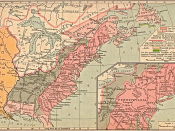The European arrival of North America was an extremely significant leap into the future. This introduction of two entirely opposite and completely separate cultures inevitably molded and shaped our present existence. Fortunately, European culture prevailed because of its technological and social advancement. If the Native Americans would have driven the Europeans from the continent, then we would all be either nonexistent, or living in unlivable, extremely crowded, filthy, disgusting places for the duration of our lives.
First, making contact with Native Americans in 1492, Christopher Columbus had no idea he had discovered the Americas. After this first contact, more and more Europeans ventured over the Atlantic to seek their fortunes in the New World. From that point on, the influences of the differing cultures were experienced on both continents; one example of this is the Columbian Exchange. In the Columbian Exchange, many foods, plants, and animals were exchanged between continents.
Among the new types of plants provided by North America for Europe were potatoes, beans, tomatoes, and tobacco. The potato, in fact, eventually revolutionized the international economy as well as the European diet, feeding the rapid population growth of the Old World.
Also benefiting from the Columbian Exchange was North America. When Columbus returned to Hispaniola, he brought with him many types of cattle, swine, and horses, which later found their way to the mainland and spread as far north as Canada in less than two centuries. Sugarcane was also introduced to the supple, warm climate of present-day Haiti and the Dominican Republic and thrived causing a sugar revolution in Europe. Another major aspect of European arrival was the transportation of slaves. With all the plantations and farms in the New World, many Africans were shipped over to help tend to the well being of the crops. However,


